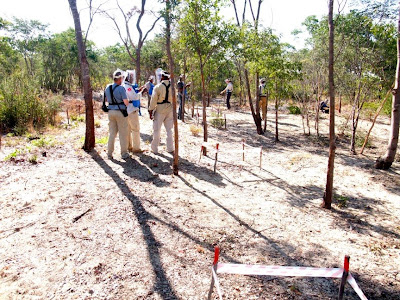Well, maybe the title is a little overly dramatic, but the last month and a bit has been pretty hectic. Since our other pilot Brent is still waiting to get his residency visa I, Gary, have been doing all the flying. Which is great, but I must admit I am a little tired trying to keep up with all the other daily things that need to be done as well. Since the last time we chatted I have been to Windhoek in Namibia, twice. Kalukembe, six times, Mukwando, three times, Luanda, twice, Ngiva, Cuvelai, Xangongo, Menongue and Chinhama. Now I realize that most of these places don't really mean a whole lot, but it means I have been away a lot and Tammy has had to hold down the fort on her own quite a bit.Speaking of Tammy, lots of you are aware that she has been fighting malaria off and on for the last year or so. It turns out, after we got some tests in Namibia, that she has never had malaria! Not once, ever?! Go figure. Most likely she had a virus of some sort that was misdiagnosed and then mistreated here in Lubango. Fortunately she is feeling much better now and is back in action. Most of the flying has been moving medical teams around as well as doing flights for USAID as they do a survey of the flooded areas of southern Angola. A significant part of southern Angola is under water for the second year in a row. This part of the country is known for its' lack of water, so to have flooding two years in a row is devastating. The real disaster is that there will again be no crops to harvest this year. The disaster is coming when last years food add runs out in the next few months. Please pray as we look to help this region of the
country.
I am always amazed as I get to accompany medical teams and see them share the love of Christ as they bring health care to some of the six million people in Angola who have no access to any medical care of any sort. It is heart breaking to see people suffering from simple injuries that turn life threatening, all because there is no health care. We are privileged to be connected with a group of doctors here in Angola and Canada that are giving of their time, energy and money to make a difference for the people of Angola.
Again we cannot thank all of you enough for your prayers and support. You have literally brought sight to the blind, strength to the weak and the ability to walk to the lame, and above all that the gospel.
A view from our house
Sunset in Lubango from our house
Sunrise over southern Angola.
 Every three metres there is an anti tank mine.
Every three metres there is an anti tank mine. Each taped off square contains an anti tank mine, when a sufficiently large area has had all the mines identified, they will be exploded in place.
Each taped off square contains an anti tank mine, when a sufficiently large area has had all the mines identified, they will be exploded in place. Every three metres there is an anti tank mine.
Every three metres there is an anti tank mine. Each taped off square contains an anti tank mine, when a sufficiently large area has had all the mines identified, they will be exploded in place.
Each taped off square contains an anti tank mine, when a sufficiently large area has had all the mines identified, they will be exploded in place.





